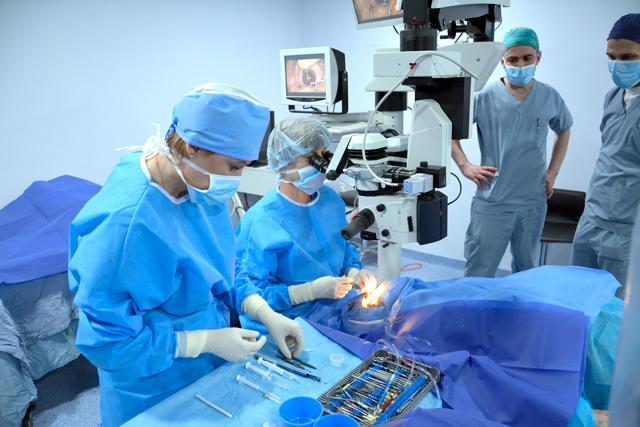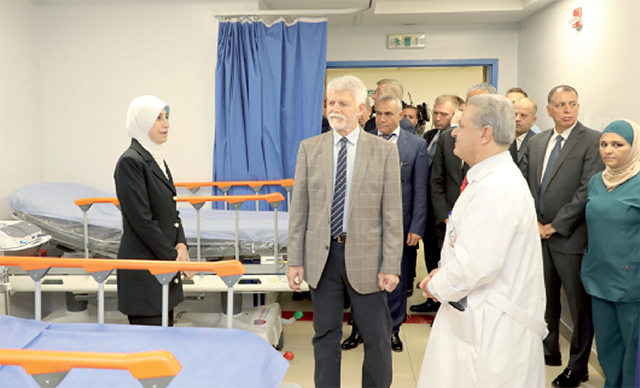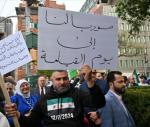You are here
Healing the wounds of conflict — Czech Medevac Programme provides medical care to Syrian refugees
By Suzanna Goussous - Mar 30,2017 - Last updated at Mar 30,2017

Two medical teams from the Czech Republic have performed surgeries on Syrian refugees and Jordanians over the past week at two hospitals in Amman (Photo by Amjad Ghsoun)
AMMAN — Two medical teams from the Czech Republic have performed surgeries on Syrian refugees and Jordanians over the past week at two hospitals in Amman, with more than 200 patients treated throughout the medical mission.
The “Medevac Programme”, a medical humanitarian programme, was started in 1994 by the Czech Republic government as an initiative to help children in conflict-ridden areas.
The programme began operating in 2012 after the eruption of conflicts in the region, the Czech ambassador to Jordan, Petr Hladik, said earlier this week.
“At the very beginning, we brought patients from Jordan to the Czech Republic but then, after 2013, we had realised that the level of healthcare here in Jordan is very advanced, and that it will be more cost-effective to operate here,” he added.
Every month, the ambassador said, one medical team arrives from the Czech Republic, including pediatricians, cardiologists, surgeons, ophthalmologists and trauma surgeons, with the primary goal of improving the quality of life of Syrians and Jordanians.
The team also consists of four ophthalmologists at Al Khalidi Hospital and six others at the Palestine Hospital, according to the medical team.
Nada Jiraskova, Libor Hejsek and Leona Kvasnickova were among the members of the medical team at Al Khalidi Hospital, while Jaromir Freiwald, Petr Spiroch and Renata Coufalova performed trauma surgeries at the Palestine Hospital.
“Given the high number of Syrians in Jordan, operating on 600 patients every year cannot solve the problem on its own; but if every country does the same, then it really has a significant help,” the ambassador said.
Hladik said it is a “win-win situation”, as the medical staff can exchange techniques and experiences with the doctors from the Czech Republic, who will be able to learn about the Jordanian healthcare system, as well as gain firsthand experience of different types of conflict-related illnesses and injuries.
Azzam Ibrahim, deputy medical director at Al Khalidi Hospital, said the hospital has dealt with more than 360 deformities of Syrian children living in the Kingdom, in addition to hosting teams from the Czech Republic, treating an average of 200 patients per mission.
Czech ophthalmologist Nada Jiraskova said the team is visiting Jordan for the fourth time, performing more than 500 cataract surgeries on elderly patients and children with congenital and traumatic cataracts.
Each cataract surgery takes 15 to 20 minutes, she said, adding that there were no complications in the cases treated during this mission.
One case she remembers vividly is one of a 14-year-old boy who had congenital cataracts and a terrible burn on his face. The team performed the surgery under general anesthetic, which is mostly used for adults, but it was successfully performed, she told The Jordan Times.
On their first ophthalmic mission, the team treated 100 cases of cataracts, with the number increasing to 116 on their second mission, 192 on the third, and around 190 on the fourth mission.
The missions took place in October 2015, spring 2016, and September-October 2016, with the latest medical mission beginning in mid-March, and another scheduled for September.
The ophthalmic team started its mission on March 21 and concluded it on March 27, according to team members.
At the Palestine Hospital, the traumatology team from the Czech Republic treated 19 cases of traumas and burns, with around two to three cases per day, in addition to seven other patients who needed less-serious treatment and physiotherapy.
Doctor Petr Spiroch said the treated children were mainly from Zaatari refugee camp and Syrians living in Amman, as well as some Jordanians.
The team, which arrived on March 22 and concluded its mission on Thursday, has performed operations on patients over the past week at the Palestine Hospital. Each surgery took between one and three hours, depending on the case.
The age group ranged from six to 70-year-old patients, Spiroch said, noting that the patients stay at the hospital for two to four days, later requiring a check-up on either a weekly or a monthly basis, based on their conditions.
Related Articles
AMMAN — A medical team from the Czech Republic recently concluded a medical mission to perform surgeries on 26 Jordanian and Syrian children
AMMAN — President of the Czech Republic Petr Pavel, accompanied by Minister of Tourism and Antiquities Makram Qaisi, escort of honour, on Tu
AMMAN — Five-year-old Ajmal Fayez might not have been able to undergo the cardiac operation she needed if it were not for the Czech governme

















